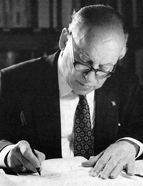

In taking stock of his career, he acknowledged that his activity in the field of historiography was somewhat scattered, conditioned by his teaching, which was inspired by the concept of ‘general culture’, and by the supervision of master’s and doctoral students, whose topics were very diverse. However, a review of his extensive and diverse bibliography shows that he not only interprets the construction of the Portuguese historical fabric, but also focuses on relations with other countries, such as France, different regions of the Iberian Peninsula, Brazil and Latin America.
His studies include Historical Relations between Portugal and France (1430-1481) (1975) covers a period of almost half a century, highlighting the political and commercial relations that Portugal maintained with France at the end of the Middle Ages, which in this country corresponds to the last phase of the Hundred Years’ War and, on the Portuguese side, to the reign of Afonso V and the beginning of the reign of João II.
His interest in Spanish culture emerged while attending the Archivo General de Simancas under the guidance of his teacher Léon Bourdon. There he met young assistants who were preparing their doctorates and would go on to become leading figures in the historiography of the neighbouring country, befriending some of them, which he further developed within the Academies of History of Spain and Portugal. The relationship between these sister institutions became intense and took root with meetings in both countries. He regularly participated in summer courses organised by Spanish universities, namely El Escorial, La Rábida (Huelva), Valladolid, Guadalajara and La Granda (Oviedo), with the Portuguese Academy of History continuing the latter. In recognition of Veríssimo Serrão’s efforts to deepen relations between the two countries, Spain awarded him the prestigious Prince of Asturias Prize for Social Sciences (1995). In his speech, the current monarch stated that “no one has done as much as Joaquim Veríssimo Serrão to bring Portuguese and Spanish historians closer together”.
This work is financed by national funds through FCT - Foundation for Science and Technology, I.P, in the scope of the projects UIDB/04311/2020 and UIDP/04311/2020.
